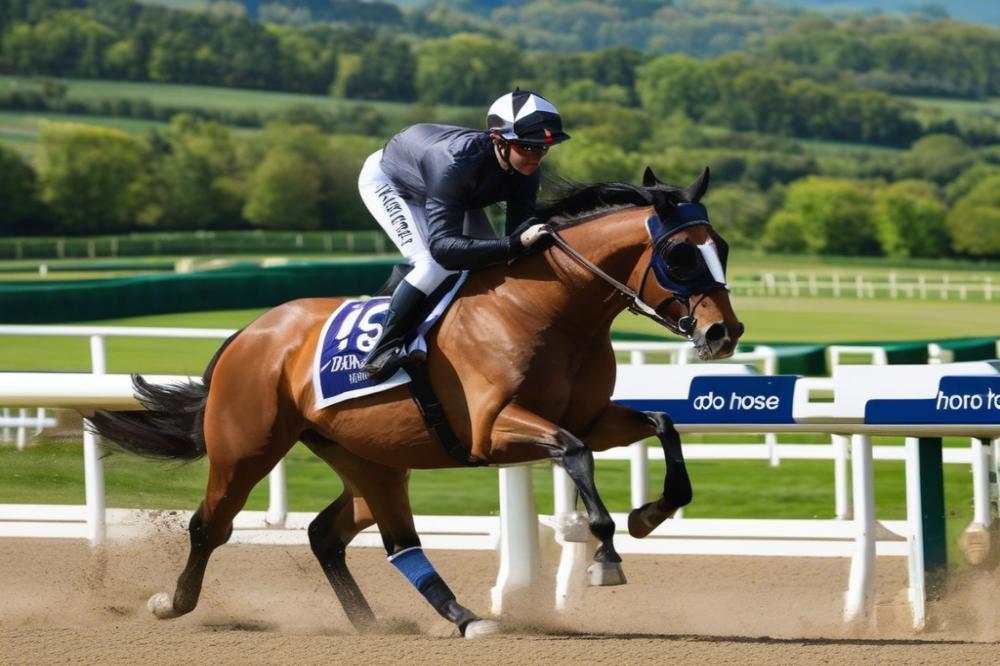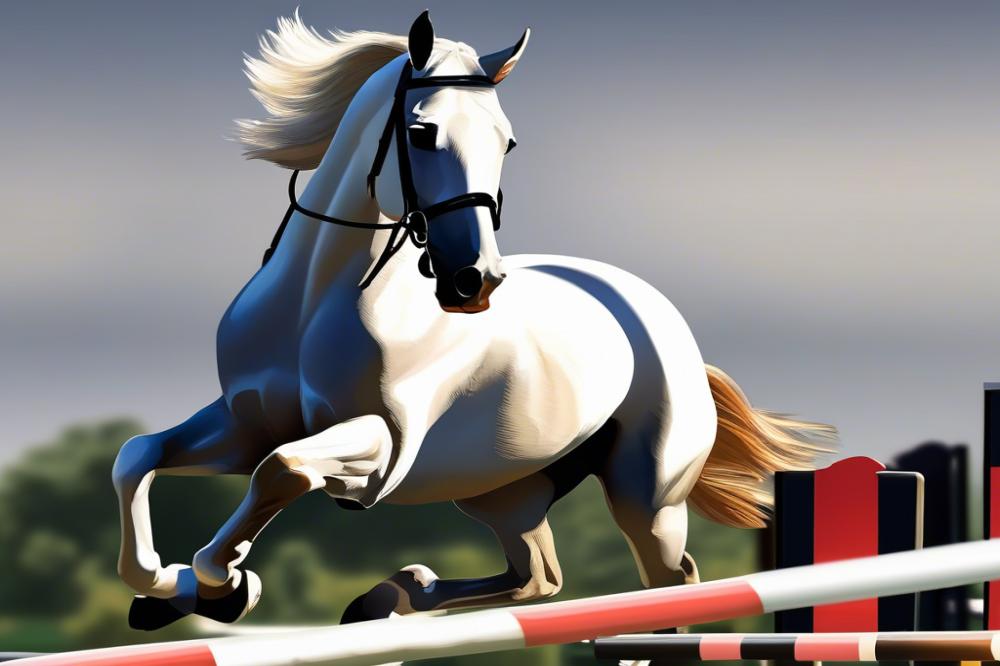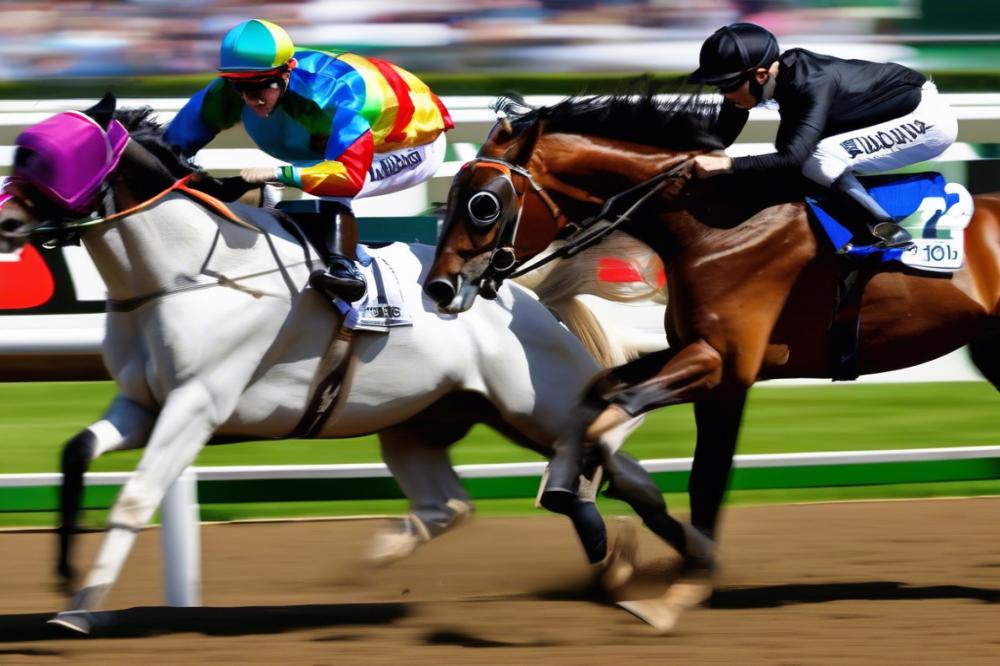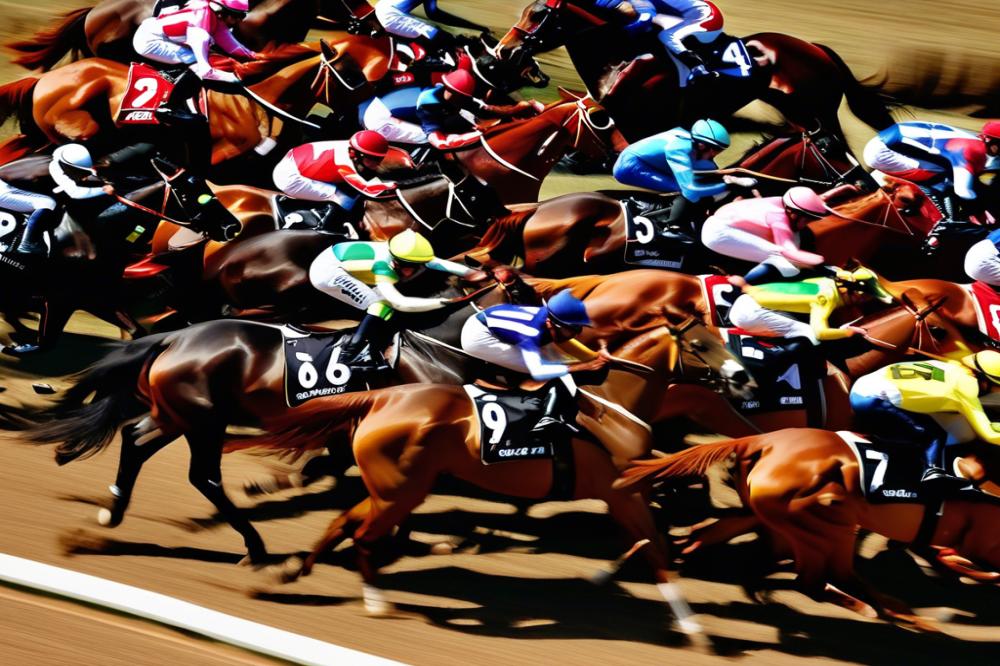Exploring the World of Horse Racing
Horse racing has long been a beloved sport, captivating audiences with its thrill and excitement. Sleek thoroughbreds gallop around the tracks, their hooves pounding against the ground, and spectators hold their breaths as they cheer for their favorites. This unique spectacle isn’t just about speed; it’s a blend of skill, strategy, and, of course, the bond between jockeys and their mounts. For many, this connection is what makes the sport so special.
People often hold various perceptions about the relationship between horses and racing. Some view it as an exhilarating experience for the animal, imagining the joy of their racehorses charging toward the finish line. Others worry more about animal welfare, fearing that these majestic creatures are simply being pushed to their limits. It’s a bit like asking if a roller coaster is fun for everyone – while some throw their hands up in delight, others feel a bit queasy and stressed out! Understanding the complex emotions horses experience is essential when we consider equine behavior and reaction to racing.
The Big Question: Do Horses Enjoy Racing?
With so many opinions out there, one question looms large: Do horses actually like racing? While some may assume that the speed and competition are thrilling for these animals, the truth may not be so straightforward. During racehorse training, we can observe how each individual horse responds to various stimuli, whether it’s the excitement of racing or the stress of the crowd. Just like people, horses have their own personalities! Some may light up with enthusiasm when it’s time to race, while others might express hesitation, challenging us to consider their feelings and instincts.
Horse sports, in general, involve a spectrum of experiences. Some horses enjoy competing, while others might prefer the serenity of trails and leisurely rides. Even with proper care, there are the occasional signs a horse is dying of old age that remind us of their fragility. Just like humans, they have emotions that can change with their environment and experiences. Therefore, understanding what makes a horse content or uneasy is vital for anyone involved in this exciting yet complex world.
As we dive deeper into the hearts and minds of these incredible animals, let’s not forget that they’re not just athletes; they are living beings with emotions. For instance, did you know some people are fascinated by buckskin horse facts? These beautiful horses have their own history and traits, showcasing the diversity within the equine world. So, sit back and join us as we explore the question of whether racing brings joy to our equine friends or if it is merely a job they tolerate.
Understanding Horse Behavior

Equine Instincts and Natural Behaviors
Horses are fascinating creatures. They evolved as prey animals, which gives them a different perspective on life. Flight instincts often drive their actions. When startled, they may bolt in an instant. This instinct is a survival mechanism that keeps them safe from predators.
Many natural behaviors mirror their instincts. For instance, grazing is a significant activity for horses. They spend hours foraging for food, which keeps them healthy. Also, they enjoy trotting, cantering, and playing with other horses. These activities help them stay fit and happy. When observing horses at play, one can see their joy. It’s a delightful sight!
Social Structures Among Horses
Horses are social animals. They thrive in herds, forming strong bonds with others. Hierarchies often develop within these groups. An alpha horse usually leads, with others following its lead. Having friends makes horses feel secure. Quiet moments of grooming between them strengthen these connections.
In horse sports, these social interactions are vital. Racehorses, for instance, can form friendships with their stablemates. A friendly environment may ease the stress related to training. An anxious horse can benefit from the calming presence of a buddy.
The Influence of Training on Behavior
Racehorse training plays a crucial role in their lives. It shapes how they respond to various situations, including racing. While their instincts remain, the right guidance can refine these natural behaviors. Skilled trainers emphasize building trust with the horse. A trusting relationship boosts confidence and enhances performance.
Understanding equine behavior helps trainers read their horses better. They learn to recognize signs of discomfort or excitement. Proper training should always prioritize animal welfare. Respecting a horse’s emotions leads to happier and healthier animals.
Many owners talk about the bond formed with their horses during training sessions. This bond can translate into better performance on the racetrack. When horses feel valued, they often respond positively. Whether it’s galloping down the track or just standing still, these connections matter.
The Physical Aspects of Racing

When it comes to horse racing, not all breeds are created equal. Thoroughbreds dominate the racetrack, known for their speed and agility. Quarter Horses excel in shorter distances, showcasing incredible bursts of energy. Arabians, with their endurance, are often considered the long-distance champs. Each breed comes with its own set of physical traits. These traits determine how well they perform in horse sports.
Physical capabilities play a huge role in racing success. Horses have powerful muscles and long legs, which allows them to run swiftly. However, their health is paramount. Problems can arise if horses are not conditioned correctly. Common issues include injuries from overexertion and joint pain. Racehorse training programs aim to strengthen a horse’s body while minimizing risks.
Exercise is vital for these animals. Regular training helps maintain a horse’s stamina. Horses also need adequate rest to recover from intense workouts. Without proper rest, a horse’s performance can suffer. Just like athletes, horses thrive on a balanced routine of work and recovery.
Emotions also play a part in how horses perceive racing. Some may seem eager to run, while others may show signs of stress. It’s crucial for trainers and owners to consider equine behavior. Happy horses often run better. A good bond between horse and handler can lead to improved performance on race day.
When talking about animal welfare, it’s essential to ensure the physical and emotional health of these athletes. Understanding their needs can bring out the best in them. Racing can be thrilling, but the well-being of horses should always come first. Owners who prioritize care create a winning environment for both horse and rider.
Lastly, stamina cannot be overlooked. It allows horses to maintain speed over distances. The training process builds this endurance gradually. The journey is important, leading to peak performance during competitions. Racing is not just about the finish line; it’s about how well a horse can get there. So, do horses like racing? Maybe they do, especially when treated well and supported emotionally!
Psychological Factors

Horses have emotions just like humans do. When it comes to horse racing, they can feel excitement, fear, and everything in between. The environment at a racetrack is often buzzing with energy. This can either fuel a horse’s enthusiasm or create anxiety. Some racehorses seem to thrive in this atmosphere, showing signs of eagerness as they approach the starting gate. Others might appear tense, with ears pinned back and eyes wide.
Watching a horse’s body language is crucial to understanding their feelings. For example, a horse that is relaxed will often have its head low and walk calmly. If it’s frenetic, its tail might swish constantly, or it could be stomping its feet. These behaviors can indicate whether a horse enjoys racing or feels stressed. Observing these signs helps trainers understand each horse’s needs better.
The impact of riders and trainers cannot be underestimated. A calm and supportive rider can make a significant difference in how a horse feels during a race. When a jockey is confident and communicates well with their mount, this can lead to a more positive experience. In contrast, a nervous or harsh rider might create stress for the horse. It’s important to recognize the role of human interaction in shaping equine behavior.
Animal welfare is a top priority in horse sports. Many organizations advocate for the best practices in racehorse training. They want to make sure that horses race in a way that respects their feelings and instincts. Proper care and training help improve their mental states and overall well-being. As more awareness grows around horse emotions, the racing community slowly adapts. It’s a journey that can lead to a healthier and happier life for these magnificent animals.
Horses are fascinating creatures with a rich emotional landscape. Their responses to racing environments reflect their unique personalities. Whether they leap forward in excitement or shy away from noise, understanding these nuances is key. In the world of racing, what happens beyond the finish line matters just as much. So, let’s keep a close eye on how our equine friends feel as they gallop toward their dreams.
Training Techniques
Training racing horses involves a mix of methods. Trainers must find the right balance between encouragement and pressure. Too much pressure can make horses anxious, while too little may not motivate them. Think of it like a dance; you have to lead without stepping on their hooves!
Racehorse training typically focuses on physical fitness, but it’s also about mental well-being. Horses are sensitive creatures. Their emotions can change quickly based on how they are treated. Positive reinforcement goes a long way. Offering treats or praise when they perform well builds their confidence.
Pressure, however, must be managed carefully. A horse pushed too hard might associate racing with stress rather than fun. Training should allow for breaks and downtime. This approach helps create a healthy attitude toward horse sports, making them feel excited rather than anxious.
Understanding equine behavior is essential for trainers. They need to read body language and facial expressions. Does the horse seem eager? Or are their ears pinned back in annoyance? Respecting a horse’s feelings can lead to better performance on race day.
Sometimes, trainers use unconventional techniques. Some play music during workouts to help horses relax or feel engaged. Others work with riders to build a bond of trust. This connection is critical. A racehorse that trusts its rider may race better than one constantly feeling pressured.
Animal welfare also plays a significant role in training practices. Healthy horses are happier horses. Providing proper nutrition, a safe environment, and rest is vital. Trainers must always keep the horse’s best interests at heart. If a horse is feeling good, they are more likely to enjoy the thrill of racing.
Overall, the way a horse is trained can significantly influence its attitude toward racing. It’s not just about winning; it’s about how they feel throughout the journey. After all, a happy horse is like a kid on a playground. They’ll run with joy, and who knows? They might even like racing!
Case Studies and Anecdotal Evidence
Many trainers believe some horses genuinely enjoy horse racing. Stories from the stables often tell of thoroughbreds that seem to thrive when they’re put on the track. Trainers share anecdotes about a horse named Seabiscuit. He was known for his spirited energy and a playful attitude. This particular horse didn’t just run; he raced with an enthusiasm that brought joy to his caretakers.
In the world of horse sports, emotions can show up vividly. Jockeys often notice how a horse’s ears perk up the moment they hear the sound of the starting bell. A horse like Affirmed, who won the Triple Crown, displayed a remarkable eagerness to compete. His trainer remarked that Affirmed could sense the excitement of race day long before it began. Such reactions hint at deeper equine behavior that reflects a love for speed and competition.
Successful racehorses often have observable behaviors that hint at their enjoyment of racing. When they enter the paddock, some horses bounce around with glee. Their tails swish, and their eyes glimmer with happiness. These signs indicate that the upcoming race is more than just a job for them. When it’s time to take off, a spirited snort or an excited whinny often fills the air, much to the delight of onlookers.
One trainer recounted a tale involving a quirky mare named Zenyatta. She had an unusual habit of playing with her jockey’s helmet before every race. It was as if she was saying, “Let’s get this party started!” Many believe this behavior reflects her joyful anticipation of the track. Such little moments can be telling. It’s not merely about winning; it’s about the thrill of the race itself.
Watching the horses interact with their surroundings during racehorse training can reveal much about their feelings. A horse that pulls towards the starting gate displays an eagerness that can’t be ignored. Others may be more reserved, but some cannot wait to stretch their legs. Each reaction showcases not just their physical readiness but also hints at their mental state. It’s fascinating how animal welfare plays a role here. When horses express such emotions, it can lead to better understanding and care for their needs.
So, is racing something that horses genuinely enjoy? Well, the evidence—from eager behaviors to emotional connections—says perhaps yes. Each horse has a personality, much like humans do. A few gallop toward the track with sheer delight while others may prefer a more laid-back approach. No doubt, these differences contribute to the diverse world of racing.
Veterinary Perspectives
When it comes to horse racing, the health of the racehorses is a top priority. Regular health checks play a critical role in keeping these athletes fit. Veterinarians often conduct physical exams, monitor vital signs, and perform diagnostic tests to catch any issues early. No one wants a horse to run when it’s not ready. It’s a bit like a human athlete training for a marathon while ignoring an injury. It just doesn’t work out well.
Veterinary opinions on horse emotions reveal a lot about their wellbeing in racing settings. Horses are social animals, and they can develop strong bonds with their trainers and jockeys. Their feelings often impact their performance. A happy horse is likely to run better than one that feels stressed or unhappy. Proper care can make a significant difference in how they face race day.
Animal welfare is also a hot topic in this industry. Some people worry that the pressure of horse sports leads to neglect. The racing world has been criticized for the treatment of some horses. Many veterinarians and animal advocates raise concerns about injuries and burnout. Gaining a better understanding of equine behavior can help address these issues. After all, a healthy horse is a happy horse, right?
Controversies often swirl around the use of medications in racehorse training. Some argue that these substances enhance performance, while others believe they mask pain. This ongoing debate stirs emotions in horse racing circles. Animal welfare activists push for stricter regulations to protect horses. They fight for transparent practices to do what’s best for our equine friends.
Education plays a crucial role in promoting the well-being of racehorses. Sharing information about proper care goes a long way. Many trainers, owners, and jockeys are committed to improving the welfare of horses. They aim to create environments that support healthy physical and mental states. We can all agree that racing should be about more than just speed. It should focus on racing joy and the love of the sport.
Reflecting on Horses and Racing
When it comes to the enchanting world of horse racing, opinions can really gallop in different directions. Many people wonder if horses truly enjoy the thrill of racing, akin to how we might feel excitement about a roller coaster ride. The truth is a bit more complicated. Horses are driven by instincts and training, and while some may seem to revel in the challenge, others might not be as enthusiastic. Just like humans, each horse has its personality and preferences.
Understanding a horse’s feelings about racing involves observing their behavior closely. Some horses prance around, eager to hit the track, while others might seem more like a cat at bath time, reluctant to join the fray. It’s not uncommon for a horse to enjoy aspects of racing, especially if they are well cared for and feel safe. Moreover, the bond between a jockey and their mount can play a crucial role. Horses often thrive on good relationships and trust, which can translate to a positive experience during a race.
Looking ahead, the future of horse racing hinges on welfare practices. Folks have become increasingly aware of the importance of treating these majestic animals with respect and compassion. As many owners, affectionately called ‘horse husbands,’ prioritize the well-being of their equine companions, there’s a growing trend toward safer racing environments. Innovations in training and racing gear, including the ongoing debate between a dressage saddle vs all purpose, can help maximize comfort and minimize stress for the horses.
As we wrap up our discussion, the key takeaway is that while horses may not inherently “like” racing, there are ways to create an environment where they feel comfortable and cared for. Balancing the thrill of competition with the needs of the horse is essential. By continuing to advocate for welfare improvements and respecting each horse’s individuality, we can ensure that racing remains a vibrant part of equestrian culture, benefiting both horses and the communities that love them.



